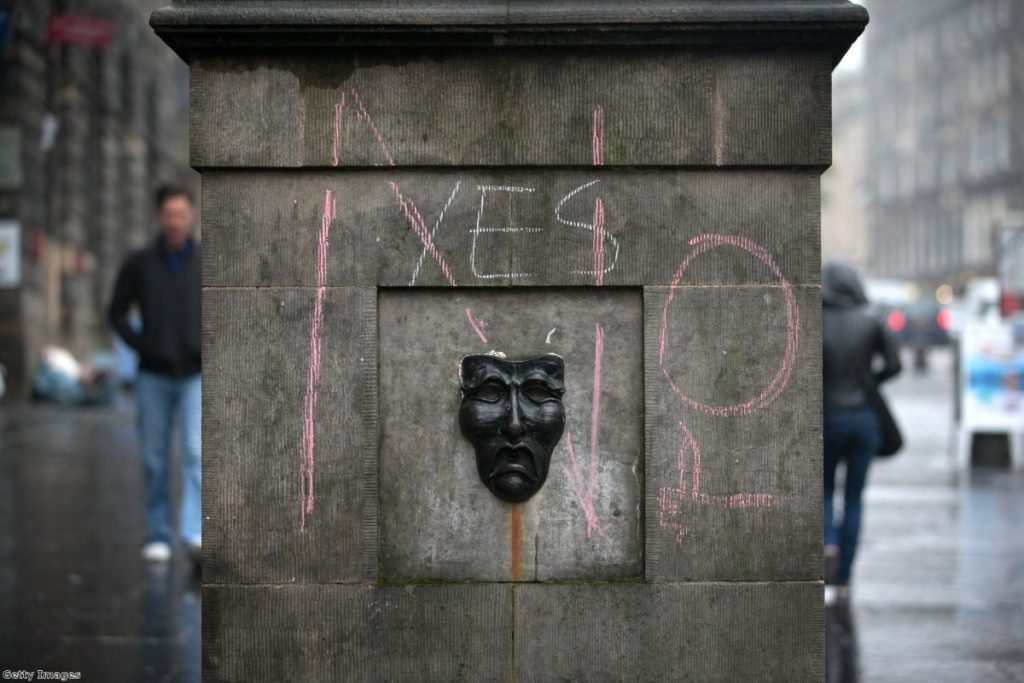We have witnessed a total breakdown in political legitimacy
Our current relief is the product of lowered expectations. Without the fortnight which preceded it, last night's Scottish independence referendum result would be seen for what it is: an appalling breakdown of political legitimacy.
It's not just that 45% of our fellow citizens in Scotland decided they wanted to live in a foreign country. It's that those who chose to stay voted mostly due to fear of what would follow, not because they dismissed the idea of separation itself. It's that the young and the poor did vote for independence, with the old and the wealthy overruling them.
No democracy could handle this. It is not enough to pat ourselves on the back for debating constitutional change without recourse to the bullet or the fist. We must face up to the magnitude of what happened the last few weeks.
The 'No' vote was not the end of the story. It was a temporary reprieve. We will be back here in 15 years unless we do something about it now.


The first response has been constitutional. That will now dominate debate. It’s entirely correct that it does so, but that is not the whole story. The constitutional mess in Britain needs to be fixed before it can give rise to further grievances, but the rhetoric in Scotland was not predominantly about constitutional reform. It was about Westminster.
Westminster is not just the political parties. It is also the media. And the lobby groups and think tanks and even charities, which stretch around it all, embedding a managerial language into the political system, creating a barrier into entry for those interested in politics but without the advantage of a PPE degree. At the root of so many of our problems is the professionalisation of politics – the adoption of a way of talking by a political class, in the media, politics and pressure groups. Even the word devo-max is an example of this. 'Home rule' could be understood by all. The fact it has warped into 'devo-max' tells you a lot about what is wrong with our politics.
Tory policies caused much of the anger during the campaign, but ultimately the party is the least blameworthy. The Tories have represented their voters in the south-east. George Osborne has put the entire British economy at risk so they find it easier to buy a house. They have pursued economic redistribution away from the needy and the marginalised, who do not vote for them, and given it to the upper working and middle classes, who do. The Tories are just doing what democracy would have them do.
It's Labour that has failed. Since Tony Blair, it has not challenged free market orthodoxy but been complicit in it. It talks in a managerial language and focus-group-approved phrases which make people reach for the remote control before the first sentence has ended. Even now, amid near-universal evidence of the failure of private enterprise in the public sector, it does not have the guts to call for nationalisation – not even for the railways.
As it happens, Ed Miliband is genuinely different in this respect. He understands the extent of market failure in public services, but he is hamstrung by Ed Ball's office. This is his reward: Glasgow, Dundee and North Lanarkshire voting 'Yes', something which should send shivers down the remaining spines at Labour HQ. Labour in Scotland is hollowed-out and shamed.
Scotland gave up on Britain partly because there was no-one left to stand up for it against the politics of neo-liberalism, a politics which strips society of its institutions, of the ties that bind people together. In a world where we are only customers, not citizens – where we are rats crawling over each other for money and nothing more – it is hardly surprising that so many of our fellow citizens believe they may as well seek an identity elsewhere. Notions of civic pride, of social responsibility, are as dead as the fax. All that exists now is the desperate scramble for cash. People want a country to mean more than flags and military adventure and nostalgia.
Labour are the most culpable, but the media and political class in London is also to blame. We will not hear much about this, because the media does not know how to cover its own failings. The one thing it will never do is turn the light on itself.
But the truth is political journalism in this country is an enormous failure. Most reporters covering it are far more like the type of person they are reporting on than the one reading it. Political journalism is complicit in Westminster's dominance of political debate. The last few weeks in Scotland have shown how shallow and false and dangerous that is. Westminster is not the political debate. It is a carnival of folly, a grotesque soap opera.
We need journalism that cares about the world, not just the grey-suited middle-aged men who write the rules. That type of coverage, combined with electoral reform and devolution, might actually create a political class worth reading about.
We came so close to catastrophe last night. It was within touching distance of the end of Britain. For many powerful people, in politics and the media, the temptation is now to slink back into a day-to-day reality which rather suits them. That would not just be irresponsible. It would be an act of warfare against Britain. Because the only way to save the country now is to change it radically.
That's not just constitutional reform. It includes our politics, the way we conduct it and the manner in which we report it.









